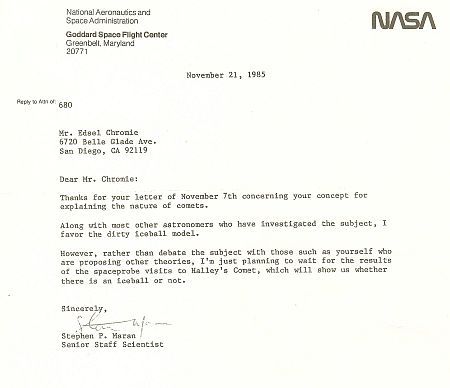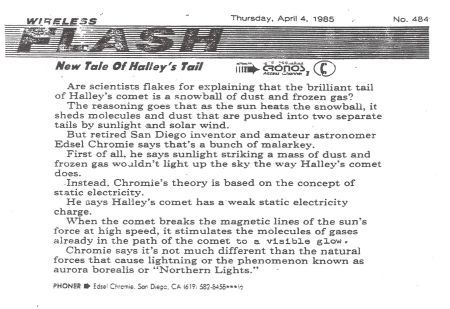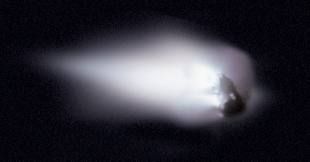
Publisher:
Bonnie King
CONTACT:
Newsroom@Salem-news.com
Advertising:
Adsales@Salem-news.com

~Truth~
~Justice~
~Peace~
TJP
Mar-24-2013 18:36

 TweetFollow @OregonNews
TweetFollow @OregonNews
Still Optimistic About Haley's Comet
Edsel Chromie Salem-News.comUnfortunately, as one scientist said many years ago: "We must wait until an entire generation of scientists die before a significant change is made in their theories."
 Haley's Comet NASA photo courtesy: UN Museum |
(SAN DIEGO) - Now that the video of the “Deep Impact: Confirming the Electric Comet” report has been reported, I wonder how much longer it will take before the scientists recognize that their basic premise was wrong? (Video is included below.)
See below a copy of a letter I received over 27 years ago from NASA and the Copley Radio News of my concept. Note the date on the Copley Radio Flash News is dated 2 months before the astronomers at Kitt Peak reported the “First ever peek at the BIRTH of a ‘dusty snowball’ when Halley’s Comet was approaching on June 26, 1985 and was still 600 million miles from the Sun.
I don’t expect any scientist to say “Mr. Chromie was right and we were wrong” but they should be expected to finally realize that the coma and tail are not the result of sublimation of water ice and dust from the comet nucleus but is the result of natural electromagnetic characteristics.
I have been optimistic each time the following inconsistencies and contradictions were discovered by our spacecraft. Inconsistencies and contradictions are not acceptable in science, yet the scientists keep making excuses why the following spacecraft probes were not confirming their theory instead of investigating why they were not detecting the basic elements of their theory. I suspect they are busy concocting an excuse why the Deep Impact did not blast a visible crater or how the “dust” magically fell right back into place in the crater on the nucleus without any visible change in the terrain.
 |
In 1985, the International Cometary Explorer flew right through the tail of the Giacobini-Zinner Comet and Flight Director Robert Farquhar, said: “With the ship well into the tail, we haven’t seen any dust at all. I’m very surprised”. In 1996, the scientists on the imaging team in Darmstadt, Germany reviewing data from Halley’s Comet, said: “Vega 1 showed that Halley’s coma was cleaner than the clean rooms manufacturers use to assemble spacecraft. The surface is blacker than black coal; like black velvet. The blackest, least reflective paint we can manufacture on Earth reflects more light”.
On April 5, 1996, NASA reported they were surprised because comet Hyakutake was emitting X-ray energy at a rate 100 times higher than it should. But, they said: “this is alright because NASA scientists like to figure these things out.” Then on April 27, 1996, it was reported: “Researchers are in a quandary. They are trying to figure out whether X-rays are coming from the comet Hyakutake or if the solar wind is blowing X-rays from the Sun into the comet’s atmosphere”.
Now, it is about time to consider the concept of the incredible speed of the comet against the radiated energy of the Sun generating the X-ray energy.
On Nov. 30, 1996, Cable station I T V broadcast a program titled, “Meteorites, Asteroids and Comets” in which Dr. Donald K. Yeomans, Senior Research Scientist at JPL, said: “The two surprises when the Shoemaker-Levy 9 comet impacted on Jupiter in 1994 were that sulfur was identified and water wasn’t. The problem is, if this thing is a comet and is mostly water ice, why didn’t we see water from the comet itself, even if it didn’t get down to the water layer of Jupiter?“ Then, another scientist continued: “The scientists speculate that the comet lost all of its water through eons of traveling through space”.
 |
This contradicts the common speculation that comets brought all of the water on Earth from outer space.
In a letter dated Jan. 30, 1997 Dr. E. C. Krupp, Director of Griffith Observatory, wrote: “I can confirm some aspects of the behavior of Shoemaker-Levy 9 remain unresolved. It would be best to examine the published papers on the comet to determine just how much it deviated from your expectations. Even if its anomalies turn out to be suggestive, however, they are anomalies. We don’t normally construct hypotheses that explain anomalies. We try to explain the preponderance of data and deal with anomalies after the foundation is established”.
These anomalies and more are still unresolved.
On March 6, 1991 the scientists reported Halley’s Comet “Sprouted a shiny dust cloud 180,000 miles across” when it had receded 1.3 billion miles from the Sun – where the ambient temperature is 346 degrees zero F. This is inconsistent with the belief that the coma and tail are created via the sublimation of water ice and dust by the heat of the Sun because the heat of the Sun produced a coma only 50,000 miles in diameter when the comet was only 50,000 miles from the Sun.
 APOD: 2010 January 4 - Comet Halley's Nucleus: |
In a snail mail letter from the late Dr. Brian Marsden, Smithsonian Astrophysical Observatory, dated Feb. 19, 1993 he wrote: “The Whipple icy-conglomerate model is obviously not correct in all of its details, but it has in very large measure stood the test of time since it was proposed in 1950. The Giotti and Vega observations, which came after your 1985 news story, proved that Halley’s Comet has a nucleus. This is something you obviously accept, so why don’t you go a little further and accept that the nucleus, by its very nature, contributes to the formation of a coma and tail. While the anomalous brightening of Halley’s Comet at such a great distance from the Sun is intriguing, I can certainly imagine some shifting of what is still basically a loose structure in such a way that a small pocket of highly volatile ice is suddenly exposed to sunlight. Coma size is not something that is easily measurable so I see no conflict between 50,000 miles near the Sun and 180,000 miles far away. That distant explosion was triggered by sunlight by its action on extremely volatile material that had not been exposed to sunlight before. Inside the asteroid belt, cometary activity is governed by water-ice vaporization. Beyond that distance, where comets are normally much less active, the water-ice is frozen solid, and any activity can be expected to be due to vaporization of more volatile hydrogen-carbon-nitrogen-oxygen compounds”.
In another mailed letter from Dr. Henry Brinton, Director of Research Program Management division, Office of Space Science, dated June 10, 1996, he wrote: “The structure of the nucleus is extremely porous. Thus heat penetrates slowly into the nucleus, even as it recedes from the Sun. When some heat reaches a pocket of more volatile ices, such as carbon monoxide, that ice sublimates rapidly, flows through the pores and entrains dust with it, making a large cloud of dust as reported when Comet Halley had receded far from the Sun in 1991”.
When I inquired why the comet nucleus did not completely sublimate when it was close to the Sun and the scientists reported the surface of the comet nucleus was 82 degrees F., in a snail mail letter from JPL dated April 22, 1986, Dr. Stephen Edberg wrote: “An insulating layer of dust allows the comet’s nucleus to be warmer than the melting point of ice. Your refrigerator uses insulation to keep food cold.”
An insulating layer of dust would have protected the nucleus when it was 1.3 billion miles from the Sun.
And now the video taken from the Deep Impact comet does not show any dust or vents spewing out particles. What appeared to be a cloud of dust rising from the impact was actually the brilliant discharge of static electricity between the nucleus and the approaching mass before the mass even touched the surface of the nucleus. The bright glow this created simply fades away as soon as the static electricity charge is dissipated.
The video was great but the narrative relative to “arcs” suggests that the scientists narrating “Confirming the Electric Comet” refers to the general form of electrical energy instead of static electricity that produced the brilliant flash seen in the video. The fact that the video does not show a cloud of dust that could mysteriously fall back on the surface to fill the crater exactly the same as the terrain was before the impact proves without any doubt that the nucleus was not either a flaky snowball, or a dirty ice ball sublimating dust particles
As a result of the Copley “Flash News”, I was involved in live radio discussions via telephone with radio commentary hosts Brian Thomas of CHUM fm at Toronto, Canada; Cindy Beleau of WBZS in Orlando, Florida; Cindy Minter of WFIR in Roanoke, Va; Mary Day and Rick Barber of KOA fm in Denver, Colorado; Bob and Betty Sanders at WISN in Milwaukee, Wis.; Deborah Wilkinson at KTLA in Los Angeles, Ca.; Art Bell of KPRI in San Francisco, Ca.; Len Roberts at ICRT in Tiawan; Dick Wainright at K59 radio station KSSK am in Honolulu, Hawaii and Howard Manschien in Winnipeg, Canada.
Professor of physics John H. Simonetti of Virginia Polytechnic Institute, Blacksburg, Virginia, heard my discussion with Cindy Minter on radio station WFIR in Roanoke, Va.. In a letter dated Feb. 24, 1991, he wrote: “Periodically returning comets become less spectacular (dimmer) with successive passages, which is consistent with their loss of material (water and dust) on each passage”. It was just 2 weeks after the date of his letter on March 6, 1991 the scientists reported “Halley’s Comet Sprouts Cloud, Erupts Into ‘Startling’ Brightness”. Now this is right after the comet should have lost the material on the passage it had just completed and should have become dimmer. The article stated: “Astronomers saw it had sprouted a shiny dust cloud about 180,000 miles across when it was some 1.3 billion miles from the Sun. The cloud was more than 1,000 times brighter than the comet was supposed to be at that distance, said Karen Meech of the University of Hawaii’s Institute for Astronomy”.
Now we purportedly have dust as black as velvet that does not reflect light as well as the blackest, dullest paint we can manufacture on Earth reflecting sunlight with “startling brightness” 1.3 billion miles from the Sun that could not be created only 50,000 miles from the heat of the Sun.
It should be noted that the space shuttle generates a charge of static electricity surrounding it, which interrupts communications between the shuttle and ground based command stations. And, at 35,000 miles per hour, it creates a cometary tail when it re-enters the more intense magnetic field of the Earth where there are sparsely scattered atmospheric gases and a near vacuum still exists. While still in Earth’s orbit, the astronauts report glowing atoms of gases occasionally drift past their window. These anomalies have been attributed to particles flaking off of the black thermal tiles reflecting sunlight. However, many of these glows begin ahead of the space shuttle – which proves that they are created by the encompassing magnetic field of static electricity surrounding the shuttle – not by particles being ejected from the shuttle.
In June 1985, the Pentagon formed a panel made up of scientists from 15 universities and laboratories “to investigate a phenomenon that causes the space shuttle to give off an infrared glow”. Obviously, the space shuttle is not a “dirty ice ball” or a flaky snowball flaking off ice and dust which reflects sunlight in the infrared spectrum. If the shuttle were comparable in size to a comet nucleus and traveled as fast as a comet, it would generate a much more intense charge of static electricity and a much larger magnetic field surrounding the static electricity charge in its mass. Then, the weak infrared glow would become a glow of visible light – the same as a comet.
I am still optimistic the scientist will finally wise up and figure out the true nature of comets, the auroras, the rings of Saturn, the glow of the “Geysers” of Enceladus, the volcanoes of Io, black holes, dark energy, dark matter, etc.
Unfortunately, as one scientist said many years ago: "We must wait until an entire generation of scientists die before a significant change is made in their theories."
 /td> /td> |

Edsel Chromie is a Detroit Michigan native who moved to San Diego in 1965. Edsel is a World War Two Navy veteran who served as a motor machinists mate on diesel electric systems where he learned about the magnetic field current swirling around the primary current flow through a wire as a part of Navy training to trace the direction of flow of the electricity in case of torpedo damage.
This led to Edsel's unique explanations of many phenomena of the universe. He also has four approved patents on solar energy and Sun tracking systems. Today Edsel writes about this unique set of life experiences for Salem-News.com, conveying information that seems especially relevant as nuclear disaster, potential changes in the earth's atmosphere, and what many view as an increasing level of natural disasters continue to dominate headlines. Perhaps many of the answers are on hand, yet unaccepted by the scientific community. You can write to Ed Chromie at this address: edchromie@cox.net
Articles for March 23, 2013 | Articles for March 24, 2013 | Articles for March 25, 2013
Salem-News.com:

googlec507860f6901db00.html



Terms of Service | Privacy Policy
All comments and messages are approved by people and self promotional links or unacceptable comments are denied.
[Return to Top]
©2026 Salem-News.com. All opinions expressed in this article are those of the author and do not necessarily reflect those of Salem-News.com.